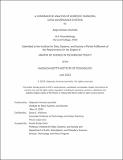| dc.contributor.advisor | Williams, Sarah E. | |
| dc.contributor.author | Jiminez Jamarillo, Aleja | en |
| dc.date.accessioned | 2023-08-23T16:19:39Z | |
| dc.date.available | 2023-08-23T16:19:39Z | |
| dc.date.issued | 2023-06 | |
| dc.date.submitted | 2023-07-17T15:19:23.779Z | |
| dc.identifier.uri | https://hdl.handle.net/1721.1/151927 | |
| dc.description.abstract | Prompted in part by the COVID-19 pandemic, cities in the United States are becoming increasingly aware of the need to improve how they govern their data. Data governance is generally understood to involve practices pertaining to the production, storage, analysis, and sharing of data either within or across organizations (Abraham et al. 2019, Beaulieu and Leonelli 2021). This thesis sought to investigate how cities in the United States are using policy tools to institutionalize data governance practices and what these policies reveal about how city governments are conceptualizing the nature of municipal data. Using a case study approach, an extensive
literature review paired with staff interviews was conducted for four cities: Baltimore, Maryland; Denver, Colorado; Portland, Oregon; and San Francisco, California. A comparative analysis of these cities’ data governance systems reveal four primary findings. First, municipal governments are seeking to balance the established use of data for public transparency with stronger practices to protect privacy. Second, data governance can be deployed for various political purposes by city governments and that deployment can frame how its purpose is defined and pursued. Third, municipal data governance systems implicitly extend beyond governing data to managing the technologies and employees who generate and handle data. Finally, the staffing plan for data governance shapes the expertise brought to bear on normative questions surrounding data generation and management as well as the capacity for data governance teams to establish legitimacy within city government. These findings point towards four recommendations for municipal policy makers: embed data governance leaders in departments whose skillsets and approaches are aligned with the intended outcomes of data governance; integrate data governance efforts with technology acquisition practices; establish and resource department-level data fiduciaries; and explicitly treat all city employees as data workers to foster a comprehensive and sustainable data governance system. | |
| dc.publisher | Massachusetts Institute of Technology | |
| dc.rights | In Copyright - Educational Use Permitted | |
| dc.rights | Copyright retained by author(s) | |
| dc.rights.uri | https://rightsstatements.org/page/InC-EDU/1.0/ | |
| dc.title | A Comparative Analysis of Domestic Municipal Data Governance Systems | |
| dc.type | Thesis | |
| dc.description.degree | S.M. | |
| dc.contributor.department | Massachusetts Institute of Technology. Institute for Data, Systems, and Society | |
| atmire.cua.enabled | | |
| mit.thesis.degree | Master | |
| thesis.degree.name | Master of Science in Technology and Policy | |
